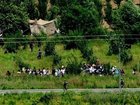Turkish Foreign Minister Ahmet Davutoglu said on Friday that Moscow has no reason to worry about the Patriot missiles Ankara has asked NATO to deploy on its troubled border with Syria.
"Patriots are strictly a measure of defense, as Russia and other countries already know," Davutoglu told reporters after a meeting with Ahmed Moaz al-Khatib, the head of the newly-formed Syrian National Coalition.
 Full Story
Full Story
Russia on Friday warned any deployment of Patriot missiles by Turkey on its border with Syria may create a temptation to use the weapons and spark a "very serious armed conflict" involving NATO.
"I understand that no one has any intention to see NATO get sucked into the Syrian crisis," Russian Foreign Minister Sergei Lavrov told reporters, reiterating concerns aired by the foreign ministry on Thursday.
 Full Story
Full Story
Iran's parliament speaker Ali Larijani on Friday noted that “Lebanese leaders enjoy the sufficient capability to resolve their problems," adding that "some forces want to destabilize Lebanon but do not have the ability to do so."
Larijani was in Beirut as part of a regional tour aimed at finding ways to resolve the crisis in Syria, media reports said.
 Full Story
Full Story
Russia on Thursday warned Turkey against deploying surface-to-air Patriot missiles to protect its troubled border with Syria, saying it should instead use its influence to help broker peace in the war-torn country.
"The militarization of the Syrian-Turkish border is of course a worrying sign," foreign ministry spokesman Alexander Lukashevich told a briefing.
 Full Story
Full Story
German Defense Minister Thomas de Maiziere said on Wednesday that he would seek parliamentary approval for a military operation in Turkey by mid-December, after Ankara requested NATO help.
He was addressing the lower Bundestag house of parliament shortly after NATO announced it had received a request from member Turkey for a deployment of Patriot missiles to protect its troubled border with Syria.
 Full Story
Full Story
Officials say Turkey has requested deployment of NATO's Patriot air defense missiles over concerns about Syria's civil war.
Turkish officials have become increasingly concerned about the civil war spilling over the border. A statement from the Turkish government said the request has been made in the "face of risks from the ongoing crisis in Syria."
 Full Story
Full Story
Turkish media say the leader of the country's 1980 military coup has defended himself in court, describing the takeover as a necessary act he would repeat under the same conditions today.
The state-run Anadolu Agency says Kenan Evren gave a testimony to court through a video conference system from his hospital bed Wednesday.
 Full Story
Full Story
Turkish Premier Recep Tayyip Erdogan accused the Iraqi government on Wednesday of trying to drag the country into civil war, amid rising tensions between Baghdad and Iraqi Kurdish forces.
"The (Baghdad) regime wants to lead this (country) into a civil war," Erdogan told reporters in Ankara before he left for Pakistan.
 Full Story
Full Story
The two surviving authors of a bloody 1980 coup in Turkey, both ailing and in hospital, appeared by video link for the first time before an Ankara court on Tuesday to hear the charges against them in the landmark trial.
Kenan Evren, 94, who became president after the military takeover, and Tahsin Sahinkaya, 86, the former air force commander, face charges of crimes against the state.
 Full Story
Full Story
Turkish Prime Minister Recep Tayyip Erdogan on Tuesday accused Israel of "ethnic cleansing" in Gaza, saying the Jewish state's air raids could not be considered self defense.
"Israel is committing ethnic cleansing by ignoring peace in this region and violating international law," Erdogan said. "It is occupying the Palestinian territory step by step."
 Full Story
Full Story



